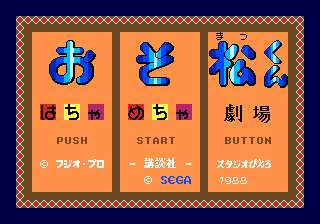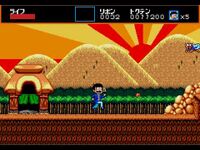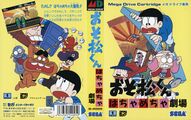Osomatsu-kun Hachamecha Gekijou
From Sega Retro
| Osomatsu-kun Hachamecha Gekijou | ||||||||||
|---|---|---|---|---|---|---|---|---|---|---|
| System(s): Sega Mega Drive | ||||||||||
| Publisher: Sega | ||||||||||
| Developer: Sega R&D 2 | ||||||||||
| Licensor: Fujio Pro, Kodansha, Studio Pierrot | ||||||||||
| Genre: Action[1][2] | ||||||||||
| Number of players: 1 | ||||||||||
|
This short article is in need of work. You can help Sega Retro by adding to it.
Osomatsu-kun Hachamecha Gekijou (おそ松くん はちゃめちゃ劇場) is a Sega Mega Drive action game developed by Sega R&D 2 and published by Sega. Based on the Japanese media franchise Osomatsu-kun, it was released exclusively in Japan in December 1988, and alongside arcade ports like Super Thunder Blade and Altered Beast, was the first original game developed for Sega's new 16-bit platform. Notable for its overwhelmingly poor critical reception, the game was universally panned for its short length, maze-like gameplay, frustrating controls, irritating soundtrack, and frequent crashes, and has gained a cult reputation as one of the worst games on the Sega Mega Drive.
As Osomatsu-kun predates the development of the TradeMark Security System, it will only function properly on pre-VA6 revision Model 1 Sega Mega Drive hardware.
Contents
Story
Iyami and Chibita have kidnapped Karamatsu, Choromatsu, Ichimatsu, Jyushimatsu, and Todomatsu in retaliation for being attacked by them and Osomatsu. Osomatsu sets out to rescue them, armed only with a slingshot. The plot of the game is presented in a short manga in the manual.
Gameplay
![]() shoots balls from a slingshot that only go a short way before disappearing.
shoots balls from a slingshot that only go a short way before disappearing. ![]() jumps;
jumps; ![]() +
+![]() jumps higher.
jumps higher. ![]() enters doors.
enters doors. ![]() crouches. START bring up some sort of items menu;
crouches. START bring up some sort of items menu; ![]() in the pause menu select the item and
in the pause menu select the item and ![]() use that selected item.
use that selected item.
Stages (incomplete)
The game is divided into three main stages, which are subdivided into four areas (the main area, the sky area, the water area and the underground area).
Development
Fujio Akatsuka, author of the original manga, was outspokenly critical about video games and considered them to be a problem plaguing Japanese youth. After the release of Osomatsu-kun Hachamecha Gekijou, the author was so offended by its poor quality that during a meeting with developers Sega R&D 2, Akatsuka became enraged and threw an ashtray at one of the developers. Confirmed by multiple employees of both Sega and SIMS (which many Osomatsu-kun staff later migrated to), the story of Akatsuka's thrown ashtray spread to other employees within the company, and eventually to the gaming public.[3]
Reception
The game was panned by reviewers.[3]
Magazine articles
- Main article: Osomatsu-kun Hachamecha Gekijou/Magazine articles.
Promotional material
Physical scans
| Sega Retro Average | ||||||||||||||||||||||||||||||||||
|---|---|---|---|---|---|---|---|---|---|---|---|---|---|---|---|---|---|---|---|---|---|---|---|---|---|---|---|---|---|---|---|---|---|---|
|
| 53 | |
|---|---|
| Based on 6 reviews | |
Technical information
ROM dump status
| System | Hash | Size | Build Date | Source | Comments | |||||||||
|---|---|---|---|---|---|---|---|---|---|---|---|---|---|---|
| ✔ |
|
256kB | 1988 | Cartridge (JP) |
References
- ↑ File:OsomatsuKun MD JP Box.jpg
- ↑ 2.0 2.1 https://sega.jp/history/hard/megadrive/software.html (Wayback Machine: 2020-07-20 09:51)
- ↑ 3.0 3.1 https://mdshock.com/2018/09/16/osomatsu-kun-the-bizarre-story-of-the-mega-drives-most-infamous-game/ (Wayback Machine: 2018-09-17 16:43)
- ↑ Aktueller Software Markt, "Oktober 1989" (DE; 1989-08-28), page 66
- ↑ Beep! MegaDrive, "February 1990" (JP; 1990-01-08), page 71
- ↑ Beep! MegaDrive, "February 1990" (JP; 1990-01-08), page 1
- ↑ Joystick, "Juillet/Août 1990" (FR; 1990-06-25), page 111
- ↑ Mega Drive Fan, "November 1989" (JP; 1989-10-07), page 49
- ↑ Sega Saturn Magazine, "September 1995" (JP; 1995-08-08), page 87





